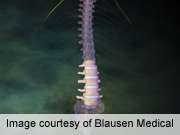Depression tied to worse lumbar spine surgery outcomes

(HealthDay)—Depressive symptoms are associated with poorer long-term outcome in patients undergoing surgery for lumbar spinal stenosis (LSS), according to research published in the Oct. 1 issue of The Spine Journal.
Maarit Pakarinen, M.D., of the University of Eastern Finland in Kuopio, and colleagues conducted a prospective, observational study of 102 patients who needed surgical treatment for LSS. Patients completed questionnaires assessing depressive symptoms, pain, and functional ability, before surgery and at three months, six months, one year, two years, and five years after surgery.
The researchers found that patients with a high depressive burden were more likely to have poorer outcome of surgery for LSS at five years, according to the Oswestry Disability Index (ODI). Linear regression analysis showed that high depressive burden was associated with higher ODI score.
"Even slightly elevated long-term depressive symptoms in LSS patients are associated with an increased risk of a poorer functional ability after decompressive surgery," the authors write. "To conclude, our results strongly suggest that even subclinical depressive symptoms in LSS patients should not be ignored at any phase of the rehabilitation period."
More information:
Abstract
Full Text (subscription or payment may be required)
Copyright © 2014 HealthDay. All rights reserved.



















